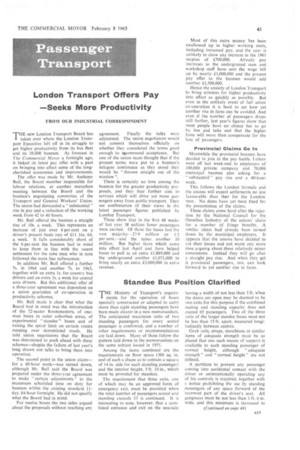London Transport Offers Pay Seeks More Productivity
Page 45

If you've noticed an error in this article please click here to report it so we can fix it.
FROM OUR INDUSTRIAL CORRESPONDENT THE new London Transport Board has
taken over where the London Transport Executive left off in its struggle to get higher productivity from its bus fleet and its 38,000 busmen. As forecast in The Commercial Motor a fortnight ago, it linked its latest pay offer with a pact on bringing into effect some of the longcherished economies and improvements.
The offer was made by Mr. Anthony Bull, the Board member responsible for labour relations, at another marathon meeting between the Board and the busmen's negotiating committee of the Transport and General Workers' Union. The union had demanded a " substantial" rise in pay and a reduction of the working week from 42 to 40 hours.
Mr. Bull offered the busmen a straight rise of 10s. a week. This represents an increase of just over 4 per cent on a driver's present basic 'rate of £11 I6s. 6d. a week. It falls considerably short of the 6 per cent the busmen had in mind to keep them in line with the recent settlement for the tube men who in turn followed the main line railwaymen.
In addition Mr. Bull offered a further 7s. in 1964 and another 7s. in 1965, together with an extra Is. for country bus .drivers and an extra 2s. a week for central area drivers. But this additional offer of a three-year agreement was dependent on a union guarantee of co-operation in productivity schemes.
Mr. Bull made it clear that what the Board had in mind was the introduction. of the 72-seater Routemasters, of oneman buses in outer suburban areas, of experimental " standee " buses and of raising the speed limit on certain routes running over derestrieted roads. He told union negotiators that the Board was determined to push ahead with these schemes—despite the failure of last year's long drawn out talks to bring them into Operation, The second point in the union claim— for a 40-hour week—was turned down, although Mr. Bull said the Board was prepared under the three-year agreement to make "certain adjustments" to the maximum scheduled time on duty for busmen within the existing standard 11day, 84-hour fortnight. He did not specify what the Board had in mind.
For twelve hours the two sides argued about the proposals without reaching any
agreement. Finally the talks were adjourned. The union negotiators would not commit themselves officially on whether they considered the terms good enough to recommend acceptance. But one of the union team thought that if the present terms were put to a busmen's delegate conference as they stood they would be "thrown straight out of the window ".
There is certainly no love among the busmen for the greater productivity proposals, and they fear further cuts in services which will drive yet more passengers away from public transport They see confirmation of their views in the latest passenger figures published by London Transport.
These show that in the first 48 weeks of last year 38 million fewer passengers were carried. Of these the buses lost the vast majority-27,9 million or 1-2 per cent.—and the tubes another 10 million. But higher fares which came into effect last April and June helped buses to pull in an extra £1,889,000 and the underground another £1,071,000 to bring nearly an extra £3,000,000 in extra revenue.
Most of this extra money has been swallowed up in higher working costs, including increased pay, and the year is unlikely to show any increase in the 1961
surplus of £700,000. Already pay increases to the underground men and workshop staff have sent the wage bill up by nearly £1,000,000 and the present pay offer to the busmen would add another £1,500,000.
Hence the anxiety of London Transport to bring schemes for higher productivity into effect as quickly as possible. But even in the unlikely event of full union co-operation it is hard to see how yet another rise in fares can be avoided. And even if the number of passengers drops still further, last year's figures show that most people have no choice but to go by bus and tube and that the higher fares will more than compensate for the loss of passengers.
Provincial Claims Go In Meanwhile the provincial busmen have decided to join in the nay battle. Letters went off last week-end to employers of 100,000 private company and 70,000 municipal busmen also asking for a " substantial" pay rise and a 40-hour week.
This follows the London formula and the unions will expect settlements no less favourable than that for the London men. No dates have yet been fixed for the presentation of the claims.
These claims come hard after the rejection by the National Council for the Omnibus Industry of the unions' claim for a -number of fringe benefits. A similar claim had already been turned down by the municipal employers. It appears that the unions have decided to cut their losses and not waste any more time arguing about these relatively minor concessions. Instead they will go after a straight pay rise. And when they get it provincial passengers, too, can look forward to yet another rise in fares.




















































































































